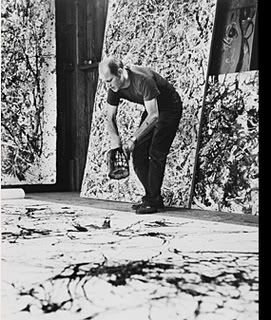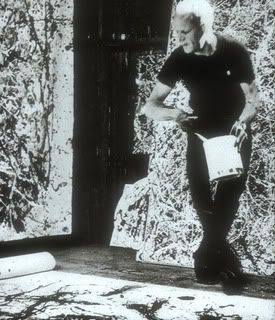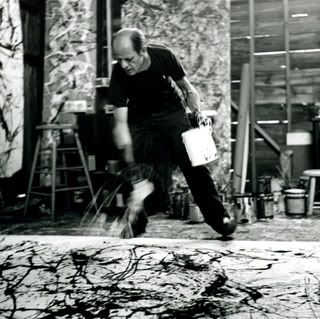I understand that I've set myself a nearly impossible task. It would be easy to retreat into old methods of working; words considered only for their beauty, or their distressing lack of it, manipulating words just for the sake of artful adornment, the verbal equivalent of tasteful and inoffensive knick-knacks, shelves jammed with bits of china and crystal that fade into the background of our lives, that have no purpose, no longer seen the way anything too familiar is unseen. I have said that words are not enough, they don't go far enough, they are always constrained by their very nature. They are defined, in the sense that they have concrete meanings, and also in that they remain within their own clear, fixed borders. Between the Alpha and the Omega may be all that is, but by placing ourselves and everything we encounter within that concordance, by living a life reduced to an index of only what is explicable, we will never see what lies outside. I don't want to pin down all that should remain volatile.
The artist as saboteur has been a useful metaphor, but outside the insular world of high postmodernist theory tends to accomplish nothing other than building yet another barricade of words. One can live and die within the confines of a theory formulated more on shock-value than any real attempt to bring about liberation, whether personal or universal. There is no rebellion in adhering to manifestos, regardless of how innovative and clever their writers and followers imagine them to be. If we must apply any label at all to the transgressions against the routine that those in the vanguard commit, I prefer fugitive, and its dual meaning; one who escapes, armed and certainly dangerous, and one who is mutable, unable to be fixed within a frame.
I know a man who is this kind of fugitive, though he has never regarded himself in this way; maybe like the others out in front he has neither use for nor time to consider such a small detail. He reminds me of Yeats at his most visionary, the Yeats who wrote "The Second Coming"; a man who has the capacity to see the beginning and the end of the epoch we find ourselves stumbling through, and is furious to hasten it to that end; a man who is not cautious in his speech and rarely abides anyone who is in theirs; a man who is willing to cross the line, because he knows the act of crossing rips open a hole that exposes the truth so many others would prefer not to see.
Yeats ripped open that hole, and something appeared to him through it. He said, "I began to imagine, as always at my left side just out of the range of sight, a brazen winged beast which I associated with laughing, ecstatic destruction". This sort of subversive imagining was dismissed by the grey flannel crowd, including the didactic and mummified critic Yvor Winters, who remarked, "…we must face the fact that Yeats' attitude toward the beast is different from ours: we may find the beast terrifying, but Yeats finds him satisfying – he is Yeats' judgment upon all that we regard as civilized. Yeats approves of this kind of brutality." What Winters missed, or chose to ignore, is the reality of the nature of existence; destruction igniting creation, and the undeniable impermanence of both. It's not a question of approval. It's a certainty that we cannot deny, both brutal and exhilarating.
We keep looking for that hole, that line, but above all we must look, in ways that those who adhere to doctrines would not dare.
Years ago, this man I know went with me to a museum, and we stood and looked at this painting. I stayed at the prescribed respectful distance one is expected to in a museum, but he walked right up to it; one hand hovering inches from its surface, walking up and down its length, eyes roving across the web of enamel stuck with cigarette butts and ashes, bootprints around the edges, the weave of the canvas exposed where a jet of paint trailed off into scattered mist. He looked for a long time, and when he turned and walked back to me, the painting at his back like a great pair of wings, I wondered what it was that had been revealed to him, I wondered what Jackson Pollock had wanted to reveal and conceal as he danced his work into existence.



His vision, Pollock's vision, and Yeats' vision are not mine to know. And what we can glimpse of them is only the slag left in the furnace, the vortice streaming off a star as it dies, stripping down and readying itself to be created again.
The artist as saboteur has been a useful metaphor, but outside the insular world of high postmodernist theory tends to accomplish nothing other than building yet another barricade of words. One can live and die within the confines of a theory formulated more on shock-value than any real attempt to bring about liberation, whether personal or universal. There is no rebellion in adhering to manifestos, regardless of how innovative and clever their writers and followers imagine them to be. If we must apply any label at all to the transgressions against the routine that those in the vanguard commit, I prefer fugitive, and its dual meaning; one who escapes, armed and certainly dangerous, and one who is mutable, unable to be fixed within a frame.
I know a man who is this kind of fugitive, though he has never regarded himself in this way; maybe like the others out in front he has neither use for nor time to consider such a small detail. He reminds me of Yeats at his most visionary, the Yeats who wrote "The Second Coming"; a man who has the capacity to see the beginning and the end of the epoch we find ourselves stumbling through, and is furious to hasten it to that end; a man who is not cautious in his speech and rarely abides anyone who is in theirs; a man who is willing to cross the line, because he knows the act of crossing rips open a hole that exposes the truth so many others would prefer not to see.
Yeats ripped open that hole, and something appeared to him through it. He said, "I began to imagine, as always at my left side just out of the range of sight, a brazen winged beast which I associated with laughing, ecstatic destruction". This sort of subversive imagining was dismissed by the grey flannel crowd, including the didactic and mummified critic Yvor Winters, who remarked, "…we must face the fact that Yeats' attitude toward the beast is different from ours: we may find the beast terrifying, but Yeats finds him satisfying – he is Yeats' judgment upon all that we regard as civilized. Yeats approves of this kind of brutality." What Winters missed, or chose to ignore, is the reality of the nature of existence; destruction igniting creation, and the undeniable impermanence of both. It's not a question of approval. It's a certainty that we cannot deny, both brutal and exhilarating.
We keep looking for that hole, that line, but above all we must look, in ways that those who adhere to doctrines would not dare.
Years ago, this man I know went with me to a museum, and we stood and looked at this painting. I stayed at the prescribed respectful distance one is expected to in a museum, but he walked right up to it; one hand hovering inches from its surface, walking up and down its length, eyes roving across the web of enamel stuck with cigarette butts and ashes, bootprints around the edges, the weave of the canvas exposed where a jet of paint trailed off into scattered mist. He looked for a long time, and when he turned and walked back to me, the painting at his back like a great pair of wings, I wondered what it was that had been revealed to him, I wondered what Jackson Pollock had wanted to reveal and conceal as he danced his work into existence.



His vision, Pollock's vision, and Yeats' vision are not mine to know. And what we can glimpse of them is only the slag left in the furnace, the vortice streaming off a star as it dies, stripping down and readying itself to be created again.




3 comments:
Great post. It's refreshing to read such good writing out in this so-called "blogosphere."
I, too, like to look at paintings from different perspectives. I'll never forget how amazed I was the first time I got up close to a Van Gogh and saw naked canvas alongside the brushstrokes.
The close view, and the far view. Such different experiences of the same thing.
Nice work. I look forward to reading more.
Actually...the finger didn't hover above, but touched the canvas. I had been drawn in by a cigarette butt trapped and fossilized in the paint. When I got nose up to the thing I saw Pollack's foot print stamped into the paint as well. It was identical in form and size to the Chuck Taylor All Stars I was wearing at the time and I couldn't resist tracing my finger along its edge. Talk about synchronicity...
Is it bad form to leave a comment on one's own post?
I'll never forget that moment. And you, as always, remember the tiny, meaningful details I tend to forget.
Post a Comment